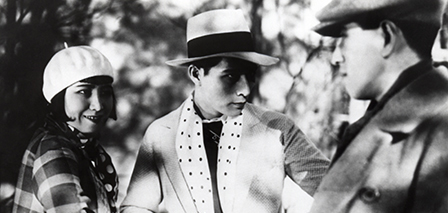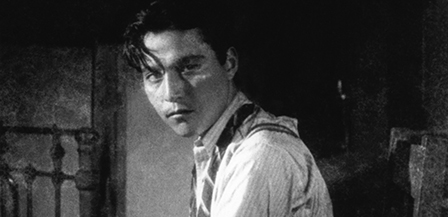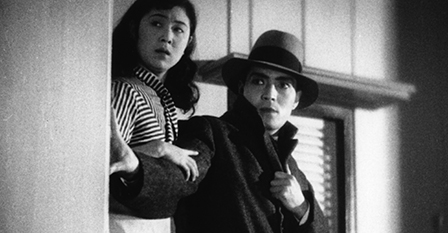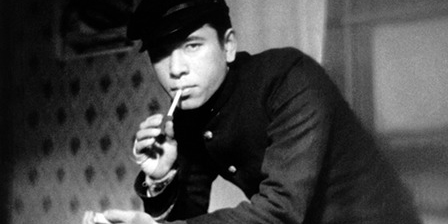Reviewed by Glenn Erickson
One really knows that a genre is established when the film culture of another country picks up the formula and interprets it in their own way. The classic case for this is Sergio Leone, who more or less stole the story and half the characters from a Japanese samurai film, and turned it into a western made by Italians in Spain. He instantly jump-started a new Italo western craze, which in turn strongly influenced American westerns, renewing a fading form. And of course, it's good to remember that Japanese critics thought that Yojimbo, the original Japanese samurai film that Leone plagiarized, was heavily influenced by... American westerns.
We hear plenty about French filmmakers of the late '40s and early '50s enthusiastically embracing American crime films. Their pictures more closely replicate the pulp fiction crime ethos than do our own. We know quite a bit about the Japanese Yakuza pictures, and now Eclipse opens our eyes with a trio of crime movies directed by the world-class director Yasujiro Ozu. Cinephiles are well acquainted with Ozu's later masterpieces, formally restrained stories of family drama and tragedy. A couple of years ago the label showed us some of Ozu's silent comedies from the early 1930s. The comedies are different, but still seem the work of the same man. The films in Eclipse's Silent Ozu --Three Crime Dramas disk set are excellent silent productions. Two were in release a full year before America's early talkie gangster epics came along, The swaggering crime boss, the lackeys, the molls, the gats in the coat pocket -- these things are clearly meant to ape silent gangster pictures by Josef von Sternberg and Howard Hawks. But the sentimental stories and socially oriented messages are very Japanese and very Ozu. All three are from the Shochiku studio.

Hailing from 1930, Walk Cheerfully precedes all but the earliest American talkie musicals. The only part of the genre model missing is the prohibition of liquor. Did Japanese crooks pattern their dress and manners after photos of Al Capone and his friends?
Slick con man Kenji, or Ken the Knife (Minoru Takada) is in league with petty thief Senko (Hisao Yoshitani) but falls for 'good' girl Yasue (Hiroko Kawasaki), who he first targets because he thinks she's rich. Kenji decides to go straight to be worthy of Yasue. His enthusiastic sidekick follows suit, becoming a chauffeur. But the rest of the mob doesn't like the idea, and tries to force Ken, now a window washer, into another heist. He's determined to be virtuous to earn Yasue's love, but the underworld is unforgiving.
It's all there at first glance -- the thugs that hang around nightclubs and boxing arenas, and the hero with the tilted fedora and narrow gaze. The 'bad' girl affects a hairdo like Louise Brooks, and is sexually aggressive with her man Kenji. When she loses him to a 'good' girl who lives with her mother, the moll has no compunction about framing them both. All three movies have strong moral stories, with almost no celebration of criminal abandon. The crooks are simply bad eggs, and the best the hero can do is to try to break free of the life.
Ozu's direction in all three films is dynamic and expressive, with many tracking shots, emotion-enhancing push-ins and close-ups of relevant details. There's no fat or padding, no nailing the camera down and forcing the actors to work as if on a stage. There's also a focus on American details in the decor, such as a poster for Joan Crawford's Our Dancing Daughters. It's easy to see that, even with a worldwide depression in force, Japan was on a belated celebration of Roaring 20's fashions.

I haven't yet made exact sense of the title That Night's Wife (also 1930), a crime tale that's a marvel of narrative economy. Taken from a story by an American writer, much of this sentimental drama plays out in real time. In the opening fifteen minutes or so a daring young gunman Shuji (Tokihiko Okada) robs an office building on his own. How he tied up the four or five employees isn't clear, but Ozu's angles and camera work are inspired -- the robbery is almost as intense as that for The Asphalt Jungle, even though we barely know what's going on.
By the time we do find out we're in the middle of what could be a 1950s live TV drama. Shuji isn't a career crook but a desperate husband who needs doctor money to save his sick daughter. He's forced to dodge the police in an extended chase in forbidding nighttime urban streets. When he finally sneaks back home the story settles into an all-night ordeal. A cop shows up, realizes that the wife is hiding something and parks himself to wait for Shuji's return. This develops into a three-way standoff. Sometimes the cop is in control, and sometimes the marrieds are pointing a gun at him. All wait anxiously to see if the little girl pulls through.
What sounds like a weak setup is expertly scripted, directed and edited. The ragged room the family calls home is the setting for good dramatic reversals. The child wants and needs Shuji nearby, and Shuji swears that he'll surrender as soon as he knows his child will pull through. At one point the cop regains total control -- he has his gun back, and even the stolen money -- yet plays along with Shuji, to prove that the law has a heart.
In all three pictures we see Ozu playing with his later signature use of cutaways to little details, views out windows, etc., to establish place and create transitions without the need for constant fades and dissolves. It clearly wasn't something he made up for his '50s movies, just to separate long static takes.

Dragnet Girl from 1934 is the most conventional and thriller-oriented of the pictures. The question of the bad man turning 'good' is still the main theme, but the situation is more complicated -- the 'bad' girl is the one who wants to reform.
Gang leader and boxing promoter Joji (Joji Oka) has a steady moll, Tokiko (Kinuyo Tanaka), who also holds down a steady job. Tokiko impresses Joji by teasing along her employer, the son of the owner of a large company. Young student and amateur boxer Hiroshi (Hideo Mitsui) eagerly joins Joji's gang. His virtuous sister Kazuko (Sumiko Mizukubo) soon comes begging Joji to set him free. Joji's interest in the 'good' Kazuko inspires the spirited Tokiko to scare her competition with a gun, but she decides she likes Kazuko too much. Trying to play the virtuous housewife, Tokiko softens and becomes infected with the desire to reform. Joji will think about that, but not before they pull off one last score -- robbing the place where Kazuko works.
Clearly more directly influenced by the amoral adventures of top crooks Paul Muni and Jimmy Cagney, Ozu's Joji is a crime-loving character who doesn't care who's corrupted and who stays saintly, as long as he's able to continue in style. By 1934 our Production Code was making standard gangster characters obsolete; in these Ozu pictures there seems to be an overriding desire to pay off every story with a similarly moralistic yet less hypocritical finish.
Ozu's style really shows here. His camera cruises down lines of Japanese typists hammering away on American typewriters, with matching camera movies along rows of male hats hanging on racks. Hoods and molls saunter down the sidewalks, but slip away when those vigilant white-gloved cops show up. The likeable Tokiko is almost a Joan Blondell character, a spirited tough girl capable of wrapping a lecherous executive around her finger. She has an odd way of both proving her love to Joji, and forcing him to go straight. (Spoiler:) She first helps him commit the robbery, and then shoots him in the leg so they can both be arrested, serve time and emerge as 'pure' upstanding citizens! Assuming that Japanese ex-cons were as shunned as our own, we deeply question the idealism of this strategy.
Ozu's camera adds to the dynamics, especially a moment that makes us jump, when Tokiko draws a pistol from her pocket with as much authority as Annie Laurie Starr from Gun Crazy, fifteen years later. When it comes to sex and violence the American Production Code really kept our movies in Kindergarten -- no lady criminal in a '30s Hollywood picture could have been this brazen.

Eclipse's Series 42 DVD set of Silent Ozu --Three Crime Dramas presents all three pictures in good presentations. The images look fine although the first two pictures have appreciable image damage in places, mostly density mottling. All three shows are intact, stable and attractive-looking. What can I say? They're edited with snap, show off plenty of dark streets and atmospheric interiors. At times they look very American, and very modern. Even some of the actors seem to be chosen for mid-Pacific looks.
All three shows have excellent silent movie piano scores composed and played by Neil Brand. They play to the moods on screen, and find good tunes for the scenes in nightclubs, etc, where source music is implied. It's a plain piano, and it sounds great.
Michael Koresky's excellent liner notes again add much to the experience, which for this eager reviewer was highly educational. Running out of Class-A American, English and French gangster classics to enjoy? Here are three new and impressive silent candidates.
On a scale of Excellent, Good, Fair, and Poor,
Silent Ozu --Three Crime Dramas DVD
rates:
Movies: Excellent
Video: Good (well transferred from surviving, sometimes flawed, elements.)
Sound: Excellent
Supplements: Liner notes by Michael Koresky
Deaf and Hearing-impaired Friendly?
YES; Subtitles: English
Packaging: Keep case
Reviewed: April 8, 2015

Text © Copyright 2015 Glenn Erickson
See more exclusive reviews on the Savant Main Page.
The version of this review on the Savant main site has additional images, footnotes and credits information, and may be updated and annotated with reader input and graphics.
Return to Top of Page
|

